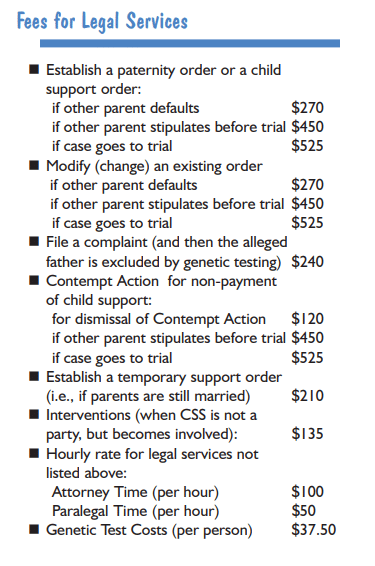
Everything you need to know about Child Support Laws in Idaho. Updated 2020.
Idaho child support guidelines are centered on the “Income shares model”.
I would say the one thing to remember is that both parents in Idaho whether married or unmarried, have a legal duty to care for their kids both financially and emotionally. However, the intricacies of financial obligation disbursement and your rights as the non-custodial parent must never be overlooked, because they determine the amount you owe. On top of that, some circumstances allow the judge to set a figure that’s ‘outside’ Idaho’s child support formula. Here is everything you need to know about child support in Idaho.
If after reading this you have further questions and would like a consultation, you can get a free case consultation from a lawyer here.
- Idaho child support guidelines basic principles
- How do you calculate child support in Idaho?
- How to modify child support in Idaho
- What happens if you do not pay child support in Idaho?
- What happens if you are held in contempt of court in Idaho?
- Is there a statute of limitations on back child support in Idaho?
- How to stop child support in Idaho
Idaho child support guidelines basic principles
Idaho child support guidelines are based on four basic principles, that is:
- Whether separated, divorced, remarried, or never married, both parents have a legal responsibility for supporting their child.
- Child support shall be given priority in any proceeding where alimony is under consideration. Also, child support implementation should be delayed until scrutiny of circumstances is done.
- Support is determined without regard to the gender of the custodial parent.
- The minimum child support in Idaho is $50 per child.
Furthermore, to avoid placing an unfair burden on low-income parents or caregivers who earn less than $800. The court is required to review incomes and living expenses to determine a maximum support amount that does not deny the parent the means for self-support at a minimum subsistence level.
That tells us that Idaho is not a mother state, and for low-income households, there are ways to lower your financial obligation. But before we get to that topic, we must first ask:
How do you calculate child support in Idaho?
Like many states that use or are adapting the Income Shares Model. Idaho courts provide a Table of Basic Child Support rates that shows the total amount of support both parents must pay. See the attached PDF for the complete chart.
How did the courts come up with these figures?
What typically happens is the court or enforcing body assigns a percentage of the total support obligation to each parent based on income level. Consequently, if you earn let us say $7000 a month, whereas your former partner rakes in $3000. Your financial obligation would be 70% of the support amount. That is because his/her $7000 is equivalent to 70% of $10,000 (combined income).
That is if all factors remain constant, however, situations are not always uniform, meaning disputes are solved on a case by case basis. So, talk to a lawyer or contact the Department of Health and Welfare to kickstart your case.
How is child support determined in Idaho?
The considerations and complications that determine the amount of support each parent is liable for includes:
- The gross income of both parents: under Idaho child support laws, parental income encompasses salaries, wages, rents, commissions, bonuses, dividends, pensions, interests, trust, income, annuities, social security, education grants, and any source of income.
- Fringe benefits: a company car, free housing, or any fringe benefit received is considered income in Idaho.
- Potential income: if the parent is unemployed or underemployed, child support is determined via potential income. However, this rule is not applicable if the parent is mentally or physically disabled.
Overall, when deciding child support, the judge will consider the following.
- Education needs of the child.
- The child’s physical and emotional needs.
- The standard of living the child would enjoy if the parents never separated.
- Parental needs, resources, and obligations.
- Medical insurance.
- Tax benefits from claiming the federal dependency exemption.
How to modify child support in Idaho
In Idaho, a basic child support calculation does not cover work-related child-care expenses. For that reason, both parents may be ordered to share reasonable child care expenses incurred by the other. Additionally, responsibilities and transport costs are determined by factoring in, one, the cost and difficulties either parent incurs in exercising visitation and custodial time, two, the financial resources of the parents not including community property interest, and the financial resources of the child.
That said. In a general sense, parents in Idaho can modify child support if:
- You experience a substantial change in financial circumstances (unemployed, incarcerated, serious medical issues).
- One parent relocates internationally.
- Change in parenting time.
Find child support, custody, and visitation modification forms here.
If you are unsure whether your child support order can be modified, consult with a family court attorney near you.
Does remarriage affect child support in Idaho?
While remarriage does not affect child support orders directly, several factors related to remarriage might change the order. For example, Idaho is a ‘community property state’, accordingly, your new spouses’ income may be included in the funds you have available to pay as support. This works on the assumption that, if your new partner is paying for a portion of your living expenses, it means that you have more disposable income that can be spent on child support.
Additionally, new children do not impact child support orders because the courts assume that you voluntarily took on the responsibility of supporting your new family. Consequently, after remarriage parents are only allowed to modify standing orders if:
- There is a substantial increase in the child’s expenses including, medical needs, education, cost of living, or age-related expenses.
- Or, when your income increases by 10%,
- Or, your income decreases involuntarily (involuntary job loss) by 10%.
In general, if you feel that your child support order is unfair, contact your County Court Clerk’s office.
Remember, you will be required to argue your case and to provide evidence. So, gather all proofs of expense or consult with a lawyer.
Can child support modification be denied?
YES, your case for modification can go either way. On top of that, court decisions are binding, meaning, you must pay even if you consider the order unfair. Therefore, be well prepared before pushing for modification.
What happens if you do not pay child support in Idaho?
The CSS (Child Support Services) is a division of Idaho’s Department of Health and Welfare that has a host of remedies aimed at collecting child support. Similarly, the department enforces both federal and state child support laws.
Enforcement traditionally begins with the custodial parent filing a case in court and getting a child support order. This support order is used by the CSS to start a case on your behalf. When that happens, enforcement begins usually with automatic income withholding.
Consequently, the delinquent parent’s wages or salary will be tapped directly at the source if the parent fails to pay within 30 days. What happens is, the CSS notifies the delinquent parent’s employer, and the adjustments are made.
What if child support payments cannot be collected via income withholding?
In such a scenario, the court or CSS will:
- Garnish the delinquent parent’s bank account.
- If the amount of back support owed exceeds $2500, the delinquent parent’s passport will be revoked.
- The delinquent parents’ retirement benefits/ PERSI (Public Retirement System of Idaho) may be withheld.
- Liens will be placed against the offending parent’s land or property.
- If back child support exceeds $2000, the delinquent parent’s driver’s, fishing, professional, or vocational license will be suspended.
- A portion of veteran disability benefits, need-based payments including SSI, or federal student loans will be withheld.
- The delinquent parent will be reported to credit bureaus.
- Income withholding.
What happens if you are held in contempt of court in Idaho?
Although jail time is an option for the judge, it is often used as a last resort because it might hinder the paying parent’s ability to pay. But that does not mean going to jail cannot happen.
That said.
The problem with contempt of court charges is that they are hard to defend, furthermore, the remedy is often jail time.
What you must remember is. Intentionally moving out of state to avoid paying child support or if the amount you owe exceeds $20,000. Then you are subject to felony charges, and that may mean a jail sentence, fine, or both.
Therefore, if your circumstances change or if you are unable to make payments within the stipulated 30 days, contact CSS or the court and notify them of your situation. Alternatively, you can contact your former partner and come up with a payment plan.
The point is, the work of the CSS and family courts in Idaho include:
- Parent tracing.
- Paternity establishment.
- To Establish medical support and financial support orders.
- Collect child support payments.
- Modify present orders.
Here is the state’s fee structure.

Is there a statute of limitations on back child support in Idaho?
According to Idaho child support guidelines, the statute of limitations for child support in the state is 5 years after reaching maturity or emancipation. Additionally, Idaho does not charge interest on retroactive support or back support. However, the interest on “judgments” is set by the legislature.
Plus, paternity must be established before the child is 18.
How to stop child support in Idaho
18 is the age of emancipation in Idaho. But that does not mean that support ends there. Idaho child support guidelines say that payments may continue until the child is 19 while still in high school, or indefinitely if the child is mentally or physically disabled. That means if all factors remain constant (Your child is out of school and not disabled), your child support payments will cease automatically on your child’s 18th birthday.
It is also possible to end child support via parental rights termination. But the problem with this option is that it severs all legal rights between a parent and his or her child, thus freeing the child for adoption.
If you require more information from a local lawyer you can get a free consultation here.
More Idaho Laws